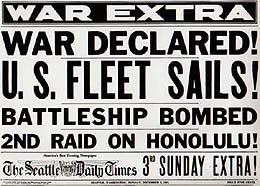Just after 9:30 a.m. on December 8, 1941, on a national radio broadcast, U.S. President Franklin D. Roosevelt (1882-1945) goes before a joint session of the U.S. Congress and begins with the following words: "Yesterday, December 7, 1941 -- a date which will live in infamy -- the United States of America was suddenly and deliberately attacked by naval and air forces of the Empire of Japan." The president requests a declaration of war against Japan. Radios all over Washington state are turned on to his speech. The day before, Japan had attacked Pearl Harbor.
In schools the speech was broadcast over loudspeakers. Twenty-one minutes after President Roosevelt spoke, the U.S. Senate voted (82 for and 0 against) to declare war. The U.S. House of Representatives concurred 12 minutes later by a vote of 388 for and 1 against. Representative Jeannette Rankin (1880-1973), a Republican from Montana, cast the lone dissenting vote. Rankin had voted against declaring war during World War I.
Pearl Harbor
The action by Congress was in reaction to Japan's air bombing raids on U.S. posts at Pearl Harbor in the Hawaiian Islands and, according to the White House, Guam, Wake, and Midway Islands. The White House also reported that Japan's attack on Pearl Harbor destroyed one "old" battleship, a destroyer, and “a large number of” airplanes." A total 1,500 deaths and 1,500 injuries were reported. Actual losses were eight battleships, three destroyers, three light cruisers, four auxiliary craft, 188 airplanes, 2,403 deaths, and 1,178 wounded.
Washington Governor Arthur B. Langlie (1900-1966) made the following statement shortly after the United States declared war:
“Your state government is prepared and ready to perform every defense task which has or will be assigned to it. The State of Washington is on the frontier of a great war. We do not know what the future holds in store for us. We do not know what trials we must go through or what sacrifices we will be called upon to make. We do know what is at stake. We know that our country, our liberties and our very homes are threatened. We are individually and as a nation being called upon to make good our pledge of allegiance to flag and country" (Seattle Star).

